Native Digital blog project: One Movement For Music 2010
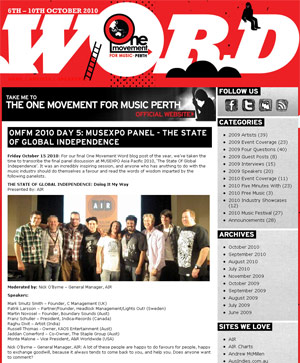 A couple of months ago I undertook a blog project for One Movement For Music 2010, a Perth-based event whose five days (Oct 6-10) consisted of daily MUSEXPO panel discussions, nightly industry showcases at live music venues throughout Perth’s inner city, as well as a three-day music festival. I first blogged for One Movement during its first year, in 2009.
A couple of months ago I undertook a blog project for One Movement For Music 2010, a Perth-based event whose five days (Oct 6-10) consisted of daily MUSEXPO panel discussions, nightly industry showcases at live music venues throughout Perth’s inner city, as well as a three-day music festival. I first blogged for One Movement during its first year, in 2009.
On behalf of my employer, Native Digital, I coordinated blog content on One Movement Word and operated the event’s social media accounts – Facebook and Twitter – from the beginning of August. On the ground in Perth, I live-tweeted it and blogged daily highlights of the conference, as well covering the festival and showcase acts in photo form – links included at the bottom of this post.
The difference between last year’s traffic and 2010 was significant. Whereas in 2009 we were starting from a literal blank slate – zero Twitter or Facebook followers, and thus no traction – this time around, we had 300 followers on Twitter and 600 Facebook fans, which meant that our blog content instantly had an audience. These numbers grew as the blog campaign continued: as of 1 November, we have 945 Twitter followers, and nearly 2,500 on Facebook.
The growth in overall blog traffic speaks for itself – compare 2010 (top image, 17,000+ visits) to 2009 (bottom image, 6,700+ visits).
August – October 2010:
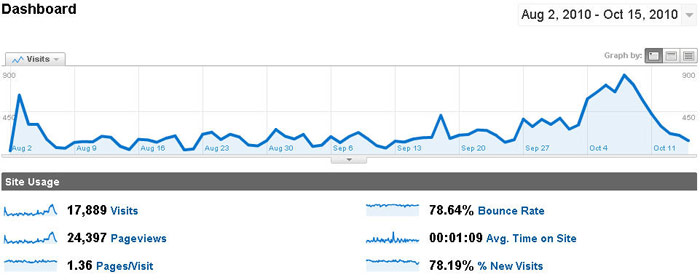
July – October 2009:
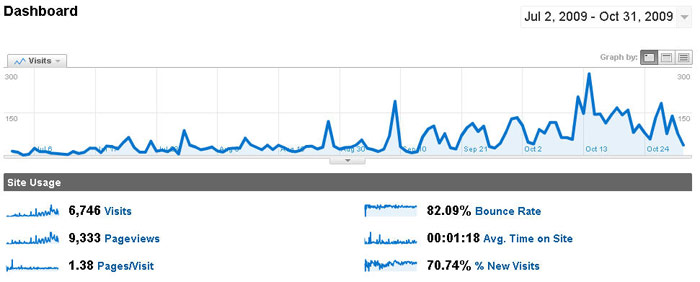 This year, One Movement Word’s blog content was split into the following categories – click for further info:
This year, One Movement Word’s blog content was split into the following categories – click for further info:
- 2010 ‘Five Minutes With’ – short Q+As with MUSEXPO guest speakers
- 2010 Industry Showcases – extended Q+As with artists who played One Movement showcase events
- 2010 Music Festival – extended Q+As with artists who played at the One Movement Music Festival
- 2010 Event Coverage – daily blog entries published while in Perth for the event
Posts in the latter category included:
- OMFM 2010 Day 1: Creative Industries Dialogue, Paul Kelly book launch, Perth music showcase at Amplifier
- OMFM 2010 Day 2: Troy Carter (Lady Gaga’s manager), Richard Kingsmill (triple j) interviews
- OMFM 2010 Day 2: Richard Kingsmill interviewed by Lars Brandle at MUSEXPO Asia Pacific 2010
- OMFM 2010 Day 2: MUSEXPO Managers Forum, Todd Rundgren Interview, State Of The Host Nation Panel
- OMFM 2010 Day 2: Live Entertainment Summit, Publishing + Copyright panel, Michael Chugg book launch, and Industry Showcases
- Photos: One Movement For Music by Twilight Festival, Friday October 8 2010
- Photos: One Movement Music Festival, Saturday October 9 2010
- Photos: One Movement Music Festival, Sunday October 10 2010
- OMFM 2010 Day 5: MUSEXPO Panel – The State Of Global Independence
- Videos: Paul Kelly and Dan Sultan performing at the One Movement Music Festival
- Videos: Murdoch University Interviews with One Movement Festival Artists
I want to give a special mention to the ‘State Of Global Independence’ panel, moderated by Nick O’Byrne of AIR, as it was an incredibly inspiring discussion, 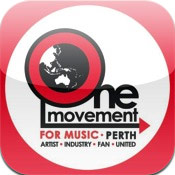 and by far the best music industry panel I’ve witnessed. Which doesn’t sound that impressive, really, but trust me: Nick and his panelists touched on some brilliant, universally-understood topics, like pursuing your passion, the nature of independence, and being kind to others without expectation of repayment. I’ll say no more; you’ll have to read my transcript of the panel at One Movement Word. It’s totally worth it. I promise.
and by far the best music industry panel I’ve witnessed. Which doesn’t sound that impressive, really, but trust me: Nick and his panelists touched on some brilliant, universally-understood topics, like pursuing your passion, the nature of independence, and being kind to others without expectation of repayment. I’ll say no more; you’ll have to read my transcript of the panel at One Movement Word. It’s totally worth it. I promise.
Thanks to Sunset Events and Native Digital for again allowing me to be a part of the One Movement online campaign.
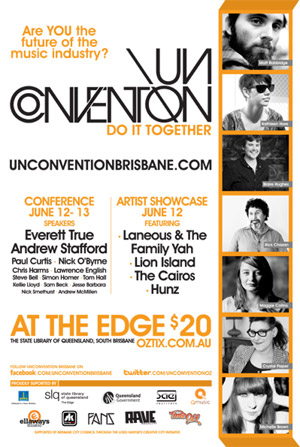 In whole, UnConvention Brisbane 2010 was a winner. I’m thrilled that 120 (or so) members of the city’s independent music scene were willing to spend their weekend – or at least, part of it – listening to and engaging with fellow venue operators, band managers, musicians, business owners and label representatives. For mine, this was the highlight: bringing people together, and putting them in a low pressure social space where they felt comfortable interacting with one another.
In whole, UnConvention Brisbane 2010 was a winner. I’m thrilled that 120 (or so) members of the city’s independent music scene were willing to spend their weekend – or at least, part of it – listening to and engaging with fellow venue operators, band managers, musicians, business owners and label representatives. For mine, this was the highlight: bringing people together, and putting them in a low pressure social space where they felt comfortable interacting with one another.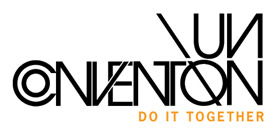 It’s a pleasure to be involved with an event that seeks to investigate how to sustain careers within Brisbane’s independent music industry. It’s important than ever to have these conversations. After spending a couple of years working in and around the local scene, I’m glad to be in a position to give something back.
It’s a pleasure to be involved with an event that seeks to investigate how to sustain careers within Brisbane’s independent music industry. It’s important than ever to have these conversations. After spending a couple of years working in and around the local scene, I’m glad to be in a position to give something back.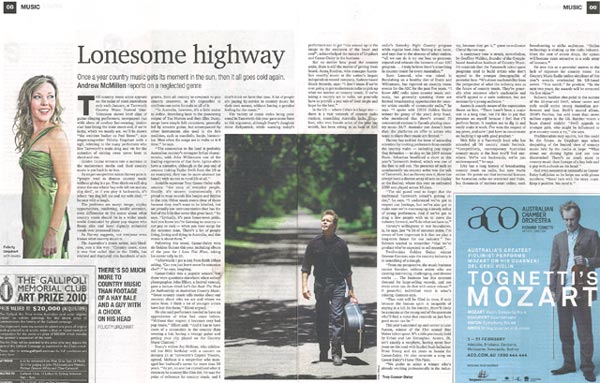
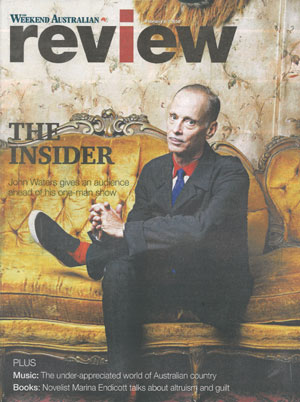 It was the most exhilarating journalistic experience of my life. Five days focussed on researching and synthesising the story of a centuries-old art form into around 2,000 words. What a challenge. I’m so glad I accepted it. It even resulted in my first
It was the most exhilarating journalistic experience of my life. Five days focussed on researching and synthesising the story of a centuries-old art form into around 2,000 words. What a challenge. I’m so glad I accepted it. It even resulted in my first  I want to discuss this review from a writing perspective. Some background is required.
I want to discuss this review from a writing perspective. Some background is required. Universal Music announced a competition called
Universal Music announced a competition called